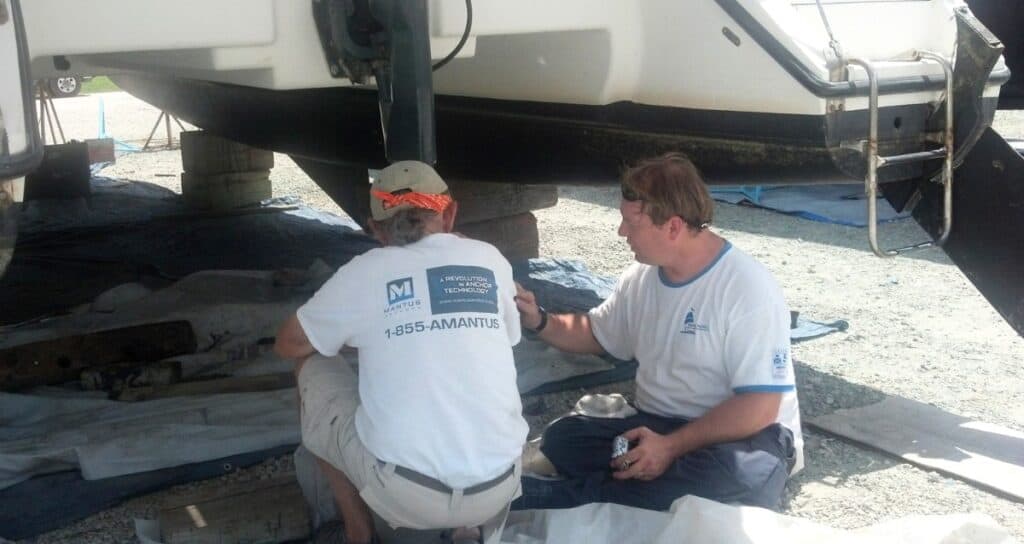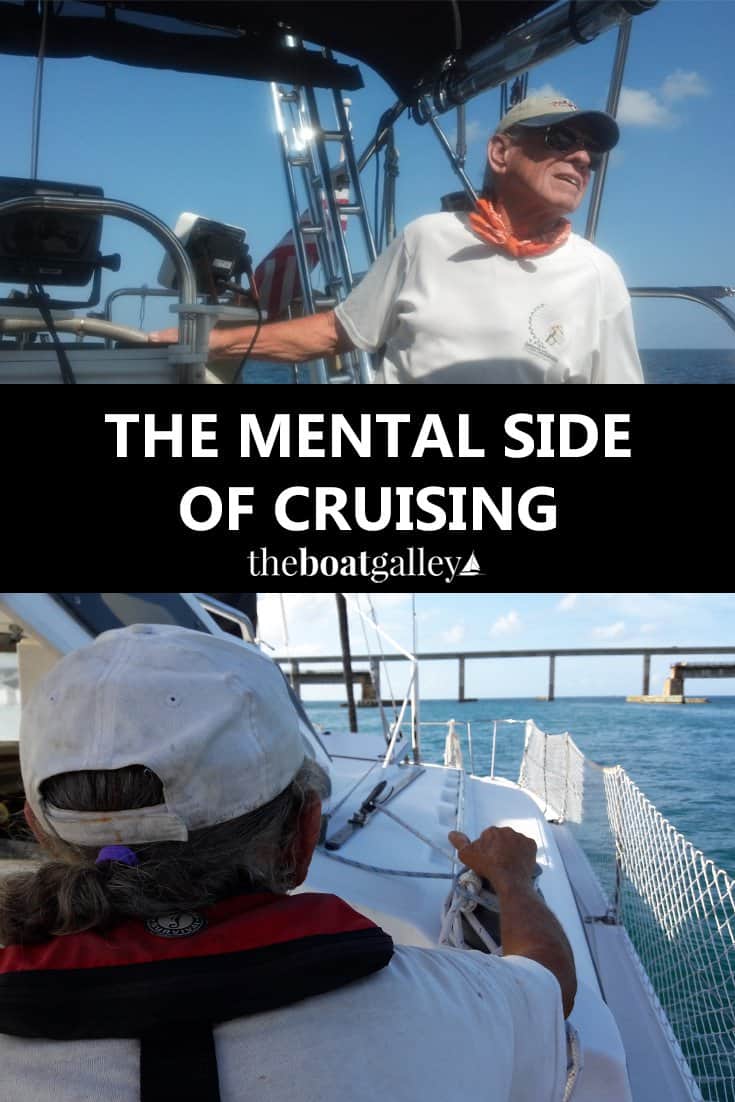Wow. The mental side of cruising. It always lurks there, in much of what cruisers write, but it’s rarely fully acknowledged.
I think we expect the cruising life to be more physically challenging, but the mental and emotional challenges are unexpected.
And yet they are huge. And in so many different ways.
- Being on the move, with things constantly changing.
- Very few constants.
- Shopping in new stores every time you go to buy something.
- If the boat is a relatively new purchase, learning how everything operates and where everything is located.
- For many, leaving family and friends and meeting new people is stressful.
- Weather watching — is it a good day to travel? Am I wasting a day when I could be traveling? Is it likely to rain while I’m ashore?
- Living without heat or air conditioning — how do I stay warm or cool enough?
- Managing power — charging the batteries, monitoring the batteries, learning what you can and can’t use without living too restrictive a lifestyle
- Managing water — how much are you using? how long will it last? where can you get more?
- Budget. Unexpected boat expenses. Many times, there’s a considerably tighter budget planned for life aboard and the resultant lifestyle choices (no, we can’t go out to dinner tonight) cause friction and wondering if the decision to go cruising was right.
- Route planning — what’s a reasonable distance to go? When are sunrise and sunset? Where are there anchorages or marinas? Will there be space available? Where can I get fuel or water? Any bridges, locks or other restrictions? What’s the weather going to be doing? Do I have to time any cuts with current? How do I find the information I need?
- Boat maintenance — am I doing everything I need to be?
- Boat repair — will I have the parts I need? Will I have the skills and tools I need? And if not, how will I get out of this mess?
- Insurance requirements to be at a certain point by a certain time.
Part of the mental challenges are “newness,” part are lacking confidence in skills, while still others are, at their heart, time pressures.
I’ve written often about the learning curve when beginning cruising. The idea that every damn thing is new.
I’ve talked about it being stressful, but not really about how it can just be exhausting. And with seemingly no end in sight.
Some people thrive on the challenge, right from the start. But most find it anywhere from tiring to just too much.
It’s not that we didn’t cope with similar things on land. We did. We planned trips, made sure we had food and water, dealt with home repairs. But we learned how to tackle these things little by little, mostly in our teens and twenties and then at a much slower pace of “new things” as we got a little older. Generally not twenty new things all at once.
And then, suddenly, we’re faced with a raging river of new things bowling us over as we begin cruising.
Over and over I hear from new cruisers asking if they were nuts to think of doing this. To try doing this.
How to cope?
I have several ideas; no one solution is perfect for everyone. Most end up doing bits of several.
Slow down. Literally stop for a few days, and then plan fewer miles per day and more lay days. Give things time to soak in, and more time to do the “everyday” chores that haven’t yet become routine: getting fuel, water and groceries; checking the weather; planning the route; taking care of maintenance or repairs at a more leisurely pace. Get some down time. Sleep.
Don’t judge your pace by others. If there are more experienced cruisers in your marina or traveling along the same general route as you, it’s easy to try to keep up with them. Don’t. They can probably do most boat chores in half the time it takes you, simply because they’ve done them so many times. You’re still learning. Everything will get faster and easier. But it’s not going to happen overnight.
Recognize that weather has a profound impact on your life. On the water, weather plays so much larger role than on land. And it’s hard for us Type-A’s to realize that we’re not in control. We want to be able to make plans and have them work out. Realizing that this won’t always happen — it won’t even happen a majority of the time — reduces the stress considerably. But yeah, it’s far more easily said than done.
Don’t try to plan too far ahead. This goes along with Mother Nature being in charge. Planning a few days in advance is great, as is having a general plan for where you’re heading. And it’s great to look ahead to anchorages and marinas and think about where you want to stop. But making specific plans for more than a day or two is just going to be frustrating as weather forecasts simply won’t be accurate that far out. It’s hard to switch to a “go with the flow” attitude, yet essential.
Enjoy where you are. Don’t focus so much on a “goal” (say, getting to Florida) that you don’t enjoy where you are. No matter where you are, there’s stuff to enjoy locally: local attractions, restaurants, hiking, scenery, history or just having a cup of coffee at the diner and chatting with the locals. Believe me, if the goal is simply to get somewhere, there are far easier ways to get there than by sailboat or trawler. The trip itself has to be the goal.
Remember: it’s an adventure. Things aren’t going to all go smoothly. It’s not a vacation; it’s a lifestyle. Keep expectations in check and be sure everyone aboard has a sense of humor. Support the others on the boat. Let everyone have some areas of competency; don’t constantly take over because you can do something faster or more easily and equally, don’t make someone else do all the work and take all the responsibility. Applaud when things go well. Stay calm when they don’t. The goal is to enjoy the trip.
More training. Now that you’ve gotten away from your home port, you may suddenly realize that there are areas where you just don’t know what you’re doing. Take stock: can you perhaps get a more experienced cruiser to help you and teach you in the process? How about an online class? Or one in person at one of the boat shows? A couple of days with a training captain or mechanic can go a long way.
Once you’ve been out, you’ll realize that you have really specific questions to ask someone. A few hundred to even a few thousand dollars can be money really well spent, both in giving you skills and also in giving you confidence.
Discuss. If there are others on the boat with you, discuss what’s keeping you up at night. Figure out ways to make whatever is bothering you less frustrating — probably by some combination of the things discussed here. If you’re single-handing, find some other cruisers to talk to. So many times, just voicing things out loud and acknowledging their existence makes it easier to deal with them. And sometimes, just realizing that other people feel the same way at times makes you realize that you’re doing okay.
And really, you are.
You Might Also Be Wondering About . . .

Carolyn Shearlock has lived aboard full-time for 17 years, splitting her time between a Tayana 37 monohull and a Gemini 105 catamaran. She’s cruised over 14,000 miles, from Pacific Mexico and Central America to Florida and the Bahamas, gaining firsthand experience with the joys and challenges of life on the water.
Through The Boat Galley, Carolyn has helped thousands of people explore, prepare for, and enjoy life afloat. She shares her expertise as an instructor at Cruisers University, in leading boating publications, and through her bestselling book, The Boat Galley Cookbook. She is passionate about helping others embark on their liveaboard journey—making life on the water simpler, safer, and more enjoyable.


Pamela Webster says
Spot on. I don’t think you can cruise successfully unless you know it’s going to be hard and consider the difficulty part of the thrill. After all, if you want an easy life you could just rent a cabana on a beach somewhere and fly there.
One thing many people don’t mention is the role of money in dealing with the challenges. Cruising is equally challenging for the relatively wealthy as it is for cruisers with modest incomes. Because the cruising life and its challenges are relative to the life prior to cruising.
I did not own a car or tv before cruising so some things other cruisers find challenging are just habit to me. A 2 mile walk to the grocery store is a continuation of my land-based life.
But as a cruisers with an older, modest boat all tasks take us even longer than they do someone whose boat is better equipped. For instance, we don’t have gauges to tell us when our water tanks are getting low. And to fill them, we have to move cushions and watch the water levels so we don’t overfill them. It takes longer than just checking a gauge on an electrical panel. Same with our fuel–one of us is on our belly with a flashlight at every fuel stop.
Heck, we navigate with paper charts. Even our planning process takes longer than someone with an integrated chart plotter.
So your advice to not try to keep up with others is even more crucial for people whose boat and income is more modest. Because cash to outfit your boat with time-saving devices can make a tremendous difference. As can the ability to pay others to repair things we have to repair ourselves.
Cathy Berry says
I think the hardest thing to factor in is how tired all of the above will make you. Constant vigilance and dealing with new variables every day takes a lot of energy. Fortunately, I sleep really well onboard, moored or at dock. Being on the water is calming and I love it, but, it is exhausting. I am new to sailing, we’ve owned our 1981 Gulfstar for 3 years and have had to put a lot of money into rehabbing her, means time out of the water too! Before that, no experience at all, my husband is an expert. We’re over 60.
Carolyn Shearlock says
Yes, that exhaustion is very real. Glad to hear that you’re loving it!
Karen Cook says
This is an excellent article!! You have hit every facet of the difficulty’s of being new to sailing.
I really want to save this to read over periodically so I’ll remember it will get easier and better!
Sometimes I think it is a bad idea to watch all the sailing vlogs out there. They sort of make it appear easy and not stressful. I start to wonder what We’re doing wrong when it takes so long to understand how to do things. But when I think of all the things we have learned and done in the 1 1/2 years we have owned our boat I am amazed. Some days I need to remind myself to look at things as the glass is half full not half empty! Thank you for having my back and reminding me we are doing ok!!
Postdock sails says
Watch Project Atticus on YouTube like we have been, they definitely show and talk of the realities of being new to sailing. We’re starting up soon too and will YouTube Postdock sails, currently have Facebook and instagram sites 👍🏻
Amanda says
It has been hard to not judge ourselves by the progress of others. Just getting up and ready before sunrise is tough, but we are getting used to it. Traveling more than 3 or 4 days in a row it is exhausting. I’m hoping that we will get faster with practice at the things we need to do between dropping the hook and pulling it up so we will be able to spend more days moving if we want to.
Getting information on anchorages, weather, routes, and availability of supplies has been easy so far, but what happens when we don’t have internet?